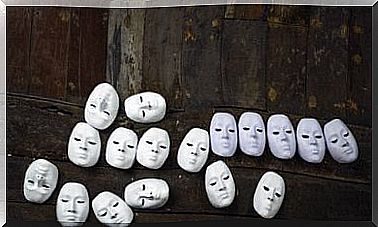Invasion Of Personal Space: When They Invade Our Intimacy

Personal space is a private, intimate and exclusive territory that concerns no one but us. There should never be an invasion of personal space, whether ours or someone else’s. This is not just about our physical issues, but also about other less palpable issues that can be invaded. We talk about things like excessive noise, the emotions that others convey to us, or information overload and the constant interruptions we suffer in our moments of loneliness or intimacy.
We often say that there are people out there who are gentle as elephants: an elephant bothers a lot of people. Whether occupying other people’s spaces, trampling on rights or invading privacy. This usually happens a lot in our work environments, which undoubtedly affects our productivity by generating a high level of stress and discomfort.
Now, there are some aspects that cannot be overlooked. Personal space does not refer only to the centimeters that we tolerate others to position themselves physically close to us, to that proximity in which the voice, smell and body heat of the other become uncomfortable or even unbearable. It is also a bubble that can burst when faced with any type of psychosensory stimulation, which also causes an invasion of personal space.
In other words, aspects such as furniture, decoration, lack of lighting, or the smell of a certain environment can also be a stress-producing focus. Other examples would be not being able to have a time slot to yourself, or being watched and controlled. All these situations are clear moments of invasion of personal space.

The invasion of personal space and stress
Ana and Paulo have just become parents and feel exhausted. The stress they experience has nothing to do with their baby, but rather with their surroundings, their family, friends and co-workers. Once in the hospital, they found their personal space continually invaded by these people, always keeping close and excited. With all the good intentions in the world, they took turns to see the newborn, take him in their arms and give a thousand advice to first-time parents.
In this small example, it is possible to see how our surroundings often cross the space that delimits our personal bubble, which we need to preserve just for ourselves. We’re not just talking about getting into an elevator full of people to experience a nuisance, but also the frequent more serious aggressions that are the result of the actions of even our dearest and closest people. Hence the need to set limits.
Thus, the complaints that reach psychologists’ offices are often a reflection of precisely this reality. There are people who have spent half their lives feeling unable to protect their personal space. This inability to manage one’s own personal boundaries generates a huge emotional cost, as it completely undermines the deepest foundations of our psychological architecture.
Let’s consider, for example, that defining, limiting and protecting our personal space is a very important key to survival. It is, moreover, an exercise in self-knowledge to understand that we all have our forbidden barriers, lines that no one should cross because that is where our self-esteem is, there where our balance and our valuable identity are.

Take care of yourself and protect your personal space
Ralph Adolph and Daniel P. Kennedy, neurologists at the University of Caltech in the United States, discovered that there is a structure in our brain that decides where the limits of our personal spaces are. It is the amygdala, that small region associated with so many functions, among them fear and our instinct for survival.
This discovery is, without a doubt, very interesting, and it reveals to us something very important: it is our brain that measures the personal limits of each one of us. It’s like a button, a personal alarm that tells us that something or someone is bothering us, that an invasion of personal space and intimacy is taking place, endangering our integrity until we feel threatened. It should also be said that the limits are different for each person. Some experience the feeling of agony and stress with very little, while others, in turn, have a much greater tolerance.
In turn, proxemics, a science that studies the effects of our interrelationships in the use of space, reminds us that one of our greatest sources of anxiety is realizing how each day we feel more overloaded in every way. Not only do we have less physical space for anything, now we also get a lot of stimuli from all sides, so many pressures and interactions that it’s hard to put filters on everything. We let everything come to us, but it surrounds us and imprisons us…

We must be able to manage our personal limits. We are talking here about learning to place physical as well as psychological distances to all the external dynamics and relationships that can potentially attack our intimacy and thus become powerful sources of stress for our lives. Sometimes it’s our co-workers, sometimes it’s a noisy environment beyond what we can handle, too crowded, cramped, hot, or anything that makes it oppressive.
At other times it is our clear inability to say no, to know and make clear what we can tolerate and what we cannot. Being explicit when showing where our personal limits are will help us to have much better relationships between us, because that’s the only way we will create more respectful, productive and, above all, healthy social environments around us.









